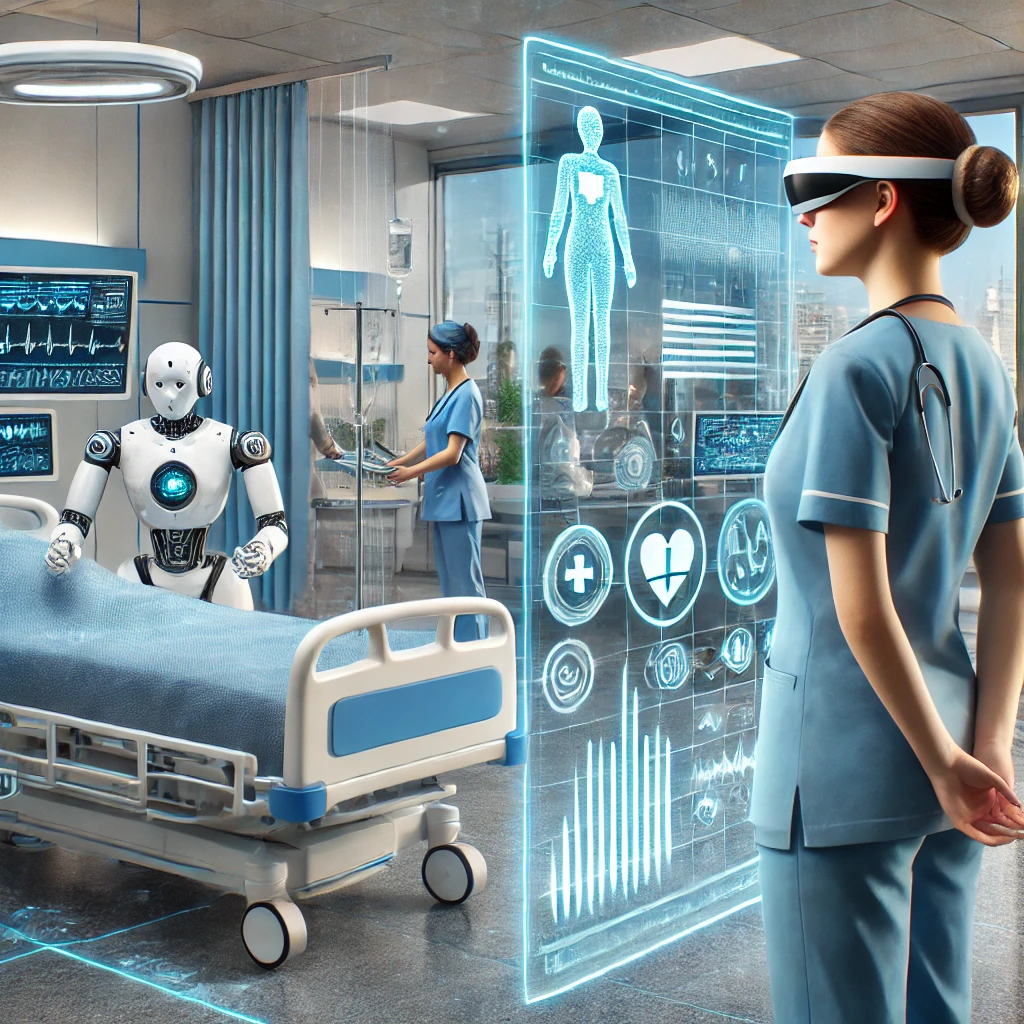The healthcare industry is undergoing seismic shifts, driven by advancements in technology, demographic changes, and evolving patient needs. At the heart of these transformations lies the future of nursing, a profession poised to play an even more critical role by 2030. Nurses, often the backbone of healthcare systems, are set to experience changes in their responsibilities, education, and workplace environments. But what exactly does the future hold for this vital profession?
Thank you for reading this post, don't forget to subscribe!

The Future of Nursing in a Tech-Driven Era
Healthcare is advancing at breakneck speed, with technology leading the charge. By 2030, we can expect nursing practices to integrate artificial intelligence (AI), robotics, and wearable health devices. These innovations will not replace nurses but rather augment their capabilities, enabling them to provide more efficient, precise, and personalized care.
AI and Decision-Making in Nursing
Artificial intelligence will become a nurse’s trusted ally. AI-powered tools will assist in diagnosing conditions, predicting patient outcomes, and managing workflows. For instance, AI algorithms might help nurses identify patients at risk of complications and guide evidence-based interventions.
Robotics in Daily Nursing Tasks
Robotic assistants are already easing the physical demands of nursing, and their presence will only grow. Robots capable of lifting patients, delivering supplies, and monitoring vital signs will reduce the physical strain on nurses, allowing them to focus on complex clinical and emotional tasks.
Wearable Devices and Remote Monitoring
Wearable technology will revolutionize patient monitoring. Nurses will oversee patients’ health remotely, using real-time data from devices like smartwatches or implantable sensors. This shift will enable proactive care, reducing hospitalizations and empowering nurses to act swiftly.
Evolving Roles and Responsibilities
Nurses will wear many hats in 2030. Beyond traditional caregiving, they will take on expanded roles as educators, care coordinators, and policy influencers.
The Rise of Nurse Practitioners and Specialists
Advanced Practice Registered Nurses (APRNs) will gain more autonomy, filling gaps left by physician shortages. Nurse practitioners will lead primary care teams, particularly in underserved areas. Additionally, specialization in fields like geriatrics, mental health, and palliative care will be in high demand.
Interdisciplinary Collaboration
Collaboration will be the cornerstone of healthcare in 2030. Nurses will work alongside data scientists, engineers, and public health professionals, contributing their expertise to design patient-centered systems. Their role as communicators between technical teams and patients will be indispensable.
Policy and Advocacy
The future will also see nurses influencing health policies. With their frontline experience, nurses will advocate for systemic changes, from addressing workforce shortages to improving health equity.
Education and Training for Tomorrow’s Nurses
Preparing for the future demands a transformation in nursing education. Tomorrow’s nurses will require a blend of clinical acumen, technological literacy, and leadership skills.
Emphasis on Technology in Curricula
Nursing programs will incorporate training on AI, telemedicine, and data analytics. Simulated environments using virtual reality (VR) will prepare students for real-world challenges, from trauma care to disaster management.
Continuous Learning in a Dynamic Field
Lifelong learning will be a cornerstone of nursing careers. Online courses, certifications, and micro-credentials will allow nurses to stay updated with emerging trends and technologies.
Leadership and Management Skills
To navigate complex healthcare systems, nurses will receive leadership training. Courses on financial management, team building, and policy-making will prepare them for administrative and executive roles.
Addressing Workforce Challenges
The nursing profession faces significant hurdles, from workforce shortages to burnout. Tackling these issues is vital for the sustainability of healthcare systems.
Combatting Burnout
Burnout remains a pressing concern. By 2030, we anticipate systemic changes to address this, such as flexible scheduling, improved staffing ratios, and robust mental health support for nurses.
Incentives for Retention
Healthcare organizations will implement retention strategies, including competitive salaries, professional development opportunities, and pathways for career advancement.
Diversity and Inclusion in Nursing
A diverse nursing workforce is essential for equitable care. Efforts to recruit individuals from varied cultural and socioeconomic backgrounds will enrich the profession and improve patient outcomes.
The Patient-Centered Future of Care
Patients will be at the heart of nursing innovations, with a shift towards personalized and preventive care.
Holistic Care Models
Holistic approaches will become the norm, addressing not just physical health but also mental and social well-being. Nurses will play a central role in coordinating care across multiple disciplines to meet comprehensive patient needs.
Community-Based Care
The future of nursing extends beyond hospital walls. Community-based care models will see nurses delivering services in homes, schools, and workplaces, reaching patients where they are most comfortable.
Telehealth as a Staple
Telehealth will no longer be a novelty but a staple in healthcare delivery. Nurses will conduct virtual consultations, provide remote patient education, and monitor chronic conditions through telecommunication platforms.
Global Implications and Opportunities
The future of nursing transcends borders, with global trends influencing local practices.
Nursing in Low-Resource Settings
In resource-limited regions, nurses will continue to be pillars of healthcare delivery. Technology, such as mobile health (mHealth) solutions, will empower nurses to provide essential services to underserved populations.
International Collaboration
Cross-border collaboration will enable the sharing of best practices and innovations. Global nursing networks will advocate for universal health coverage and standardized education frameworks.
Climate Change and Disaster Response
As climate change intensifies, nurses will be on the frontlines of disaster response. Specialized training in emergency care, infectious diseases, and public health will equip them to handle crises effectively.
The Human Touch in a Tech-Driven Future
Despite technological advancements, the essence of nursing lies in empathy and human connection. Nurses will continue to be the compassionate bridge between patients and the healthcare system.
The Role of Emotional Intelligence
Emotional intelligence will be more crucial than ever. Nurses will navigate complex patient emotions, offering comfort and support in an increasingly digital world.
Preserving the Nurse-Patient Bond
Even with AI and robotics, the nurse-patient relationship will remain paramount. The ability to listen, empathize, and advocate cannot be replicated by machines.
FAQs
What role will technology play in the future of nursing?
Technology will augment nursing practices by automating routine tasks, improving diagnostics, and enabling remote patient monitoring, freeing nurses to focus on patient care.
How will the nursing workforce evolve by 2030?
The workforce will see expanded roles for nurse practitioners, increased specialization, and greater involvement in leadership and policy-making to address healthcare challenges.
What educational changes are expected for nurses?
Nursing education will emphasize technology, leadership, and interdisciplinary collaboration, incorporating tools like virtual reality and AI training in curricula.
Will nursing shortages continue to be an issue?
While efforts are underway to address shortages through better incentives and retention strategies, demographic shifts and increasing healthcare demands may prolong workforce challenges.
How will nurses adapt to global challenges?
Nurses will take active roles in disaster response, climate change mitigation, and providing equitable care in resource-limited settings through innovation and collaboration.
What is the importance of empathy in future nursing practices?
Empathy will remain central to nursing, ensuring that patient care remains personal and compassionate, even in a technologically advanced environment.
Conclusion
The future of nursing promises exciting opportunities and formidable challenges. As technology reshapes healthcare, nurses will adapt by embracing innovation while preserving the core values of their profession—compassion, advocacy, and holistic care. By 2030, nursing will not only respond to the needs of patients but also shape the evolution of healthcare itself. This dynamic, resilient profession will continue to thrive, proving indispensable in creating a healthier world.
Suggestions for Links
Inbound Links:
- “The Role of Nurse Practitioners in Modern Healthcare”
- “How AI is Changing Healthcare Delivery”
Outbound Links:
- World Health Organization’s Nursing and Midwifery Overview (WHO Nursing)
- American Nurses Association on Future Nursing Goals (ANA Nursing)


